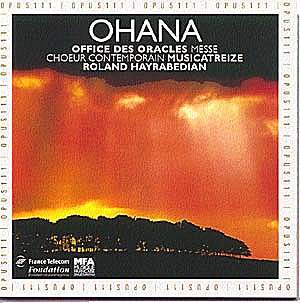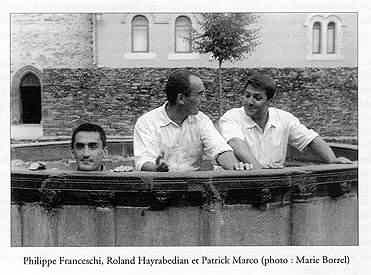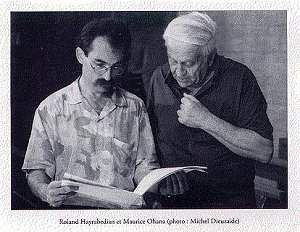
A very exciting release, and perhaps the easiest of three recent CDs with
which to approach this important composer. The voice is central to
the music of Maurice Ohana (1914-92), and for his
explorations beyond the frontiers of equal temperament. His roots were
Mediterranean and he derived the third-tone, used in these two works, from
Andalusian flamenco, where it is successfully combined with equal temperament
harmony in the guitar accompaniments. Ohana uses both systems together in
the same works.
Even more radical and significant to us, in view of recent developments in
UK, is that both these works were specifically composed for amateur and
professional performers working together. He succeeded in retaining all the
innovative features of his musical language whilst keeping within the reach
of amateurs. That is no mean feat! There is now a very active movement in
England, spearheaded by 'COMA' (Contemporary Music for Amateurs) and a growing
body of uncompromisingly idiomatic contemporary music for amateurs to play
and sing (see CD review of
Spectrum). Ohana can be regarded
as one of the pioneers in that field.
The familiar text is treated by Ohana in his Mass (1977) as an archetype,
and the music taps both ancient liturgical music and that of our own time,
with solo vocal lines supported by choir and instruments to provide harmony
and colour. The Alleluia turns the ensemble into a huge pealing of
bells, and there is an exultant peak in the Sanctus. The longer
Office des Oracles (1974) is a major work for four female soloists,
two choirs and an instrumental ensemble of fourteen players, constituted
with wind, brass, keyboards and percussion predominating. There are three
conductors for the Office, pictured
relaxing in a giant grape-crushing tub outside the XIth C. Abbiatale
Saint-Foy.


The notes with this Ohana CD (as well as for timpani 1C1044, also
reviewed for MotW) are provided by Harry Halbreich, knowledgeable champion
of a group of twentieth century composers whom he regards as having been
unwarrantably side-lined. He has written ' - - - if such obvious innovative
geniuses as Maurice Ohana and Giacinto Scelsi are excluded, then musical
history - - should be re-written - - -'. I had the pleasure of meeting
and talking with Maurice Ohana, not long before he died, a kindly, unpretentious
man (see the note by the conductor Roland Hayrabedian - above
left) who appeared not put out that only half a dozen of
us attended his pre-concert talk at St John's, Smith Square.
Halbreich's notes for Opus 111 are informative as ever, but says 'the
titles of the twelve sections of Office des Oracles say more about it than
any commentary'. So I follow suit, and whet your appetite with these
titles: Alpha - Oniracle - Dragon a trois têtes - Minotaur aux miroirs
- Son changó - Météoracle - Tarots - Interrogation des
oiseaux - Écriture automatique - Oroscope - Pythie - Omega.
The performances and recording (in a chapel at Arles and the abbey at Conques)
are beyond reproach. Lavish presentation by Opus 111, with full texts and
translations for Oroscope in Office des Oracles and the Mass
(Ohana does not set the Credo).
Reviewer
Peter Grahame Woolf


